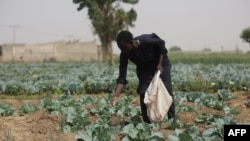Africa's agriculture ministers are meeting in Uganda this week to discuss the best way to transform the continent's food production systems. The ministers hope to agree on a 10-year action plan to reduce Africa's reliance on food from outside the continent and adapt its farming practices to climate change and modern technology.
The ministers and more than 2,000 delegates are meeting in Kampala to discuss sustainable agriculture and food production systems.
Speaking at the opening of the summit, Uganda's prime minister, Robinah Nabbanja, urged ministers to provide policies and solutions that can make the continent food self-reliant.
"As the continent's agriculture sector ministers, I urge you to deliberately work to reduce Africa's over-reliance on food imports from outside of the continent,” Nabbanja said. “We must position the continent in such a manner that our agriculture sector is resilient to climate change as well as other shocks and is adaptive to advances in technology."
In recent years, Africa has witnessed a sharp increase in food prices due to droughts, floods, conflict and climate change.
According to the U.N. trade and development agency UNCTAD, the number of people experiencing food insecurity worldwide increased from 512 million in 2014 to more than 790 million in 2021.
The African ministers are meeting in Uganda again to review strategies for food security in the next 10 years, given the changing weather, people's food preferences, increased conflicts and shrinking agricultural farmlands.
Despite the challenges ahead, David Nabarro, former coordinator of the U.N.-backed Scaling Up Nutrition movement and co-founder of the 4SD Foundation, an organization that works on the transformation of food systems, said that with cooperation between countries and organizations, Africa has the capacity to be food self-sufficient.
"This could lead Africa as a region becoming less of a region that needs to import nutritious food for its people and move to a situation perhaps in 10 years where it can be self-sufficient or even in some cases more exporting,” Nabarro said. “So individual African country's examples would be brought together and shared because the whole cadre approach is where you monitor progress and share that progress between countries and use that as a way to bring everybody's standards up higher."
The director of the International Livestock Research Institute, Appolinaire Djikeng, said strong collaboration and greater investments in agriculture by African governments could bring lasting change in Africa's food production.
"The food systems transformations and food systems challenges demonstrated that one organization cannot do it alone,” Djikeng said. “It is about a coalition, and I want to see that part strengthened. But more importantly, I would like to see governments really investing, committing to invest in the national budget to develop agriculture and building capacities so that we have people who are trained, we have institutions, but also linking that to policy, we need to see the right policy."
According to analysts who track the progress of the goals and targets of the Comprehensive African Agricultural Development Programme (CAADP), several countries, such as Benin, Ethiopia, Lesotho, and Malawi, have spent more than 10% of their budgets to improve their agriculture sectors.
The summit ends Saturday, and heads of state are expected to attend and endorse a CAADP strategy and action plan that could shape the continent's food systems for 10 years beginning in 2026.




